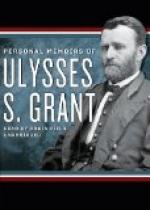After reaching shore, or Shell Island, the labor of getting to Corpus Christi was slow and tedious. There was, if my memory serves me, but one small steamer to transport troops and baggage when the 4th infantry arrived. Others were procured later. The distance from Shell Island to Corpus Christi was some sixteen or eighteen miles. The channel to the bay was so shallow that the steamer, small as it was, had to be dragged over the bottom when loaded. Not more than one trip a day could be effected. Later this was remedied, by deepening the channel and increasing the number of vessels suitable to its navigation.
Corpus Christi is near the head of the bay of the same name, formed by the entrance of the Nueces River into tide-water, and is on the west bank of that bay. At the time of its first occupancy by United States troops there was a small Mexican hamlet there, containing probably less than one hundred souls. There was, in addition, a small American trading post, at which goods were sold to Mexican smugglers. All goods were put up in compact packages of about one hundred pounds each, suitable for loading on pack mules. Two of these packages made a load for an ordinary Mexican mule, and three for the larger ones. The bulk of the trade was in leaf tobacco, and domestic cotton-cloths and calicoes. The Mexicans had, before the arrival of the army, but little to offer in exchange except silver. The trade in tobacco was enormous, considering the population to be supplied. Almost every Mexican above the age of ten years, and many much younger, smoked the cigarette. Nearly every Mexican carried a pouch of leaf tobacco, powdered by rolling in the hands, and a roll of corn husks to make wrappers. The cigarettes were made by the smokers as they used them.
Up to the time of which I write, and for years afterwards—I think until the administration of President Juarez—the cultivation, manufacture and sale of tobacco constituted a government monopoly, and paid the bulk of the revenue collected from internal sources. The price was enormously high, and made successful smuggling very profitable. The difficulty of obtaining tobacco is probably the reason why everybody, male and female, used it at that time. I know from my own experience that when I was at West Point, the fact that tobacco, in every form, was prohibited, and the mere possession of the weed severely punished, made the majority of the cadets, myself included, try to acquire the habit of using it. I failed utterly at the time and for many years afterward; but the majority accomplished the object of their youthful ambition.




